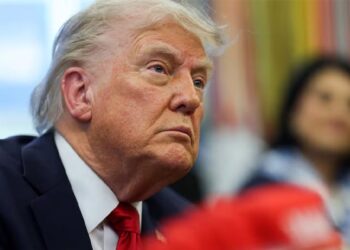- Fresh tariffs on smartphones, computers, and electronics are on the way.
- The trade conflict has led to the most volatile markets seen in five years.
- Senator Warren criticizes Trump’s tariff strategy as chaotic.
On Sunday, U.S. President Donald Trump announced that he would reveal the tariff rates on imported semiconductors within the week, indicating there will be some flexibility for certain companies in the industry.
This announcement suggests that the current exemptions for smartphones and computers from his reciprocal tariffs on China might be temporary, as Trump aims to overhaul trading practices in the semiconductor sector.
“We wanted to simplify the situation for various companies because our goal is to produce our chips and semiconductors right here in the U.S.,” Trump shared with reporters while onboard Air Force One, heading back to Washington from his resort in West Palm Beach.
While Trump refrained from stating whether items like smartphones could still be exempted, he emphasized the need for flexibility, saying, “Nobody should be so rigid.”
Earlier that day, Trump initiated a national security trade investigation focusing on the semiconductor industry.
“We are thoroughly examining Semiconductors and the entire ELECTRONICS SUPPLY CHAIN in the upcoming National Security Tariff Investigations,” he posted on social media.
Following the announcement on Friday about exemptions from high reciprocal tariffs, there was optimism that the tech sector might avoid being pulled into the intensifying conflict between the U.S. and China, thereby keeping consumer goods like phones and laptops affordable.
However, Trump’s Commerce Secretary Howard Lutnick clarified on Sunday that essential technology products imported from China would face new separate tariffs, on top of those for semiconductors, in the upcoming two months.
Last week, Trump’s inconsistent remarks about tariffs resulted in significant fluctuations on Wall Street, marking the most volatility since the onset of the COVID-19 pandemic in 2020. The Standard & Poor’s 500 index has plummeted over 10% since Trump assumed office on January 20.
Lutnick noted that Trump plans to implement a “special focus-type of tariff” on smartphones, computers, and other electronic goods in about one to two months, alongside industry-specific tariffs on semiconductors and pharmaceuticals. These new tariffs will be distinct from Trump’s reciprocal tariffs, which saw levies on Chinese imports increase to 125% last week.
“He’s implying that these products are exempt from the reciprocal tariffs, but they are included in the semiconductor tariffs that are likely to come in about a month or two,” Lutnick explained in an interview on ABC’s “This Week,” predicting that the tariffs would lead to production of these items within the U.S.
China retaliated by raising its tariffs on U.S. imports to 125% on Friday. Following Lutnick’s comments on Sunday, China announced it is assessing the implications of the recently implemented product exemptions for technology.
“The bell on a tiger’s neck can only be untied by the person who tied it,” stated China’s Ministry of Commerce.
Billionaire investor Bill Ackman, who had supported Trump’s presidential campaign but has criticized the tariffs, urged Trump on Sunday to pause the extensive reciprocal tariffs on China for three months, similar to what he did for other nations last week.
If Trump were to temporarily reduce the tariffs on China to 10% for 90 days, “he would achieve his goal of prompting U.S. businesses to shift their supply chains away from China without causing disruptions and risks,” Ackman expressed on X.
‘Daily Changes’
Sven Henrich, founder and chief market strategist for NorthmanTrader, was very critical of how the tariff situation is being managed.
“Sentiment check: The biggest rally of the year would occur on the same day Lutnick gets fired,” Henrich remarked on X. “I recommend that the administration clarifies who controls the narrative because it seems to change every day. U.S. businesses cannot make plans or invest amid this inconsistency.”
Senator Elizabeth Warren, a Democrat, also criticized the recent alterations to Trump’s tariff plan, warning that it could negatively impact economic growth and contribute to inflation.
“There is no actual tariff policy—just chaos and corruption,” Warren declared on ABC’s “This Week,” shortly before Trump’s latest post on social media.
In a notice issued to shippers late Friday, the U.S. Customs and Border Protection agency published a list of tariff codes exempted from these import taxes, which included 20 categories of products such as computers, laptops, disc drives, semiconductor devices, memory chips, and display panels.
In an interview on NBC’s “Meet the Press,” White House trade adviser Peter Navarro stated that the U.S. has extended an invitation to China for negotiations but criticized the country’s involvement in the dangerous fentanyl supply chain. He did not include China on the list of seven entities—with the United Kingdom, the European Union, India, Japan, South Korea, Indonesia, and Israel—currently in talks with the administration.
Trade Representative Jamieson Greer told CBS’s “Face the Nation” that there were no current plans for Trump to engage in discussions with Chinese President Xi Jinping regarding tariffs, accusing China of exacerbating trade tensions by imposing its own levies. However, he expressed hopes for reaching some agreements with non-Chinese partners.
“My objective is to secure meaningful deals before the 90-day mark, and I believe we’ll achieve that with several nations in the coming weeks,” Greer stated.
Ray Dalio, the billionaire founder of the largest hedge fund globally, expressed concerns during an appearance on NBC’s “Meet the Press” about the potential for the U.S. falling into a recession, or worse, as a consequence of the tariffs.
“We are currently at a pivotal decision-making point and very close to a recession,” Dalio cautioned on Sunday. “I fear for something more severe than a recession if this situation is not resolved properly.”





